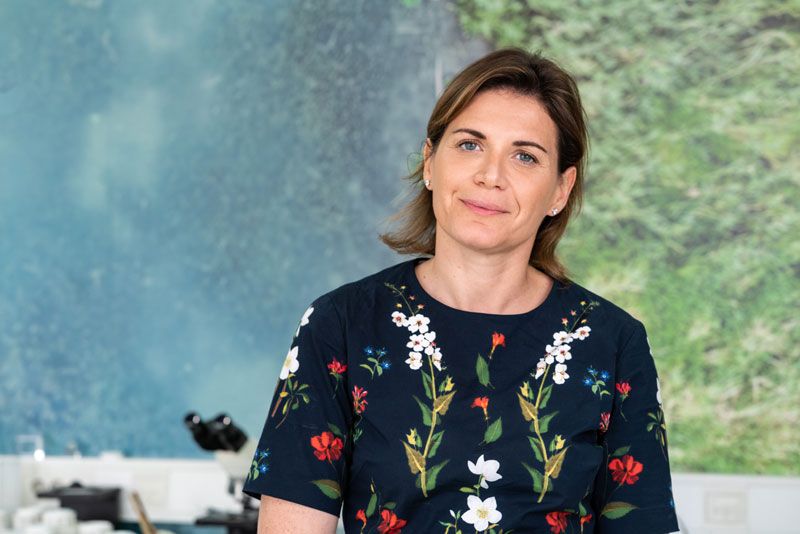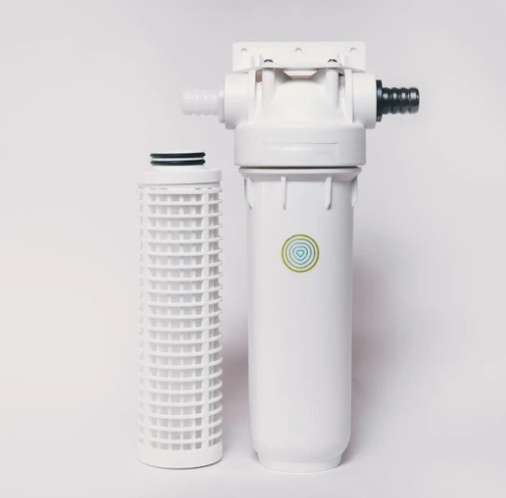Features
Former Slovenian lawyer develops filters for washing machines to tackle microplastic pollution at the source
21 June 2021
4iP Council speaks to PlanetCare Founder and CEO Mojca Zupan

Covid 19 shines a spotlight on humanity's need to rally around Climate Action and where there is high demand for change and a ticking clock there is innovation. Inventor, founder, CEO and environmental activist Mojca Zupan is a remarkable woman; passionate about the environment she quit her job as a corporate lawyer three years ago to found PlanetCare, an acclaimed SME, innovating to prevent washing machines discharging microplastics into our oceans. 35% of the microplastics drifting in our oceans come from our dirty washing machine water [1].
"35% of the microplastics drifting in our oceans come from our dirty washing machine water." [2]
PlanetCare changed the narrative of sustainable living and paved the way for policy changes. We speak to Mojca about her role in this transition, about how she built her SME into a policy, industry and household change agent, and about the challenge of monetising IP and using it to break into an established sector.
What triggered you to focus on the ocean microplastics issue and found PlanetCare?
The idea for PlanetCare originated in a discussion I had with a former client when I was a corporate lawyer. While working on a case related to industrial grey water I learned about filtration from experts. Around the same time, I went to a touring exhibition on marine litter in Ljubljana, where I was born. The extent and impact of microplastic pollution was shocking. So, with the filtration expert, I explored solutions that I was able test when a friend, who wanted to grow spirulina at home, needed a filter to capture plant leaves. I came to understand the problem of capturing fibre, which unlike spirulina, doesn't have a flat surface; it is long and thin like spaghetti.
Microplastics have now been found everywhere. Due to their small sizes they are highly mobile and easily ingested by many organisms. They also have the ability to bind chemical pollutants. Studies show they cause poisoning [3], infertility [4], and genetic disruption [5]. It is known that microplastics can enter the human body through the nose or mouth and small enough particles can end up in our lung tissues.
![Daphnia-z-vlakni[81].jpg](/application/files/5416/2385/9918/Daphnia-z-vlakni81.jpg)
Ocean microplastic inside an organism
How has PlanetCare evolved?
When we created the first prototype in late 2017 the filter was an 'after school' project for me: I still had my day job as a lawyer. We knew we had a workable solution, but it was too early to take it to market. I gave up my job and put my heart, soul and all my savings into building PlanetCare. Today, we are team of ten and growing. We have created domestic, commercial and industrial filters that multiple external tests show to capture 90% of the microplastics in textile washing. We've also developed a mobile unit to refurbish our cartridges. Ours is the only solution that works so efficiently and, in addition, is the only closed loop model with no microplastics leakage into the sea though product disposal.

PlanetCare's Household Filter
What is innovative about your filters?
Applicability is the main product innovation in addition to the innovations around brand and business model. We tried all sorts of solutions to filter out the microplastics and, in the end, found that the simplest approach worked. Our filters apply mesh to a three stage filtration process; a solution that was designed initially for dust, not liquids, and is similar to the type used in car exhausts.
Patenting filters is very difficult as almost everything you can do has been done. PlanetCare took what exists and assembled and applied it differently. We have world-wide patent protection through WIPO.
You leverage multiple IP types, what has been your experience?
A key learning I'd like to share with other SMEs is that all too often people think IP = patents when it is so much more than that. We need to understand and leverage all the different types of IP to build a total solution. PlanetCare's value is also in its trademark, design, trade secrets, brand, data and customer base. The challenge is in creating and weaving together these different IP types and assets in order to monetise them.
How did you achieve market visibility?
The white goods sector is really tough and in washing machines, for years, there has been very little innovation beyond energy efficiency. It's a highly competitive market where margins are very tight. Half a centime of added cost counts for a lot and, as filters can cause inconvenience to product engineers in addition to added cost, manufacturer curiosity in PlanetCare was slow to turn into action.
To be heard, I had to leverage a vision and a marketing story which to me is part of the total PlanetCare innovation story. This is about a different way of perceiving washing. Our message resonated with the French Secretary of State, Brune Poirson and I was invited to share my views with her team. When France passed its ground-breaking anti-waste law we saw traction not just in France, but beyond it. Our story shows how climate action needs a simultaneous bottom up and top down approach.
"What we're doing goes way beyond conscience clearing. It's time we convince policymakers to make microfiber filters in washing machines mandatory. The same that has already been done with catalytic converters for reducing pollution from vehicles."
- Mojca Zupan, founder and CEO, PlanetCare
How would you describe your client base?
PlanetCare users are mindful and future-oriented. They consume consciously; always looking to reduce their ecological footprint by choosing products designed for function and longevity. It is about having a positive impact on nature and being the value-driven change makers our world needs. As a consequence, we have extremely high customer retention and trust. Corporates find such engagement hard to attain so this is a commercial advantage.
Can you tell us more about your experience licensing your innovations?
Three years ago we wanted to license our solutions to washing machine manufacturers so we filed for the patents and went to the manufacturers, but at that time, no-one seemed to care. We were stubborn and decided to prove that consumer demand existed by developing a retrofit technology that is integrated into a closed loop model. We brought this to the market and now have over 1000 happy users.
In tandem, a systemic change occurred at the policy level, influenced by ocean experts and others including PlanetCare. The French government regulated that by 2025 all washing machines will need to have a built-in filter. The fact that we had a proof of concept helped us to influence both manufacturer and policymakers. We're now negotiating a licensing contract with a large washing-machine manufacturer. We are very proud of our contribution to this transition and believe many countries will follow the French initiative.
Women innovators such as yourself are a rare find, what words of encouragement can you offer other women?
Women tend to think that if they don't have the next moon rocket they don't have enough. Self-doubt and confidence hold us back so much more than it does men. This, I've come to realise, is a particular issue with European women and it may also be a generation issue.
I honestly believe it is a bit harder for women in my generation but younger women are better equipped. They are stronger and there is more of a 50:50 balance in all aspects of life.
We have to take pride in our achievements and leverage everything we have. Female founders tend to ask for a lot less than men so my message is 'be better and be bolder'. Use your own intelligence and your emotional intelligence which women have a lot of.
What advice would you offer policy makers seeking to encourage people such as yourselve towards becoming innovative entrepreneurs?
The slowness of the patent process doesn't follow the speed of SME engineering development and we struggled to learn about all the things we could leverage in the meantime. Support in this area would be very welcome. We have patents for our technology but there is "know-how" in our refurbishment system which is also very important to protect. Brand assets are very important too because they can be a huge enabler of partnerships.
"IP is not the place to make savings. It is the most important place to spend money".
- Mojca Zupan, founder and CEO, PlanetCare
"Only 9% of small and medium-sized companies in the EU have registered IP rights but those that do report 68% more income per employee than those that don't"
- EUIPO, EPO 2021 [6]
What is your advice for other inventors and entrepreneurs?
It's very important to pay attention to your IP so find a really reputable patent attorney who you get along with because the relationship matters. IP is not the place to make savings. It is the most important place to spend money.
Pay attention too to your brand assets. Large corporations still do not recognise the true value of start-up brand assets. Every start-up has a great story, passion and endless motivation which is all part of a package. For green starts up this is at the core of their technology and their existence.
Being the first can be very important as it gives you front-runner status but you have to maintain that position. For the manufacturers we speak to today our first mover advantage is of great value as we have three years of experience and have taken account of valuable feedback from customers and partners to shape our product.
Author: Emma Bluck
Useful links
- Watch Mojca's talking about her journey as an SME with IP licensing legal expert, Mark Snelgrove, on this EUIPO-4iP Council webinar recording
- Learn more about PlanetCare's mission and solutions
- Check out 4iP Council's resources for SMEs
- Apply for IP support from the EUIPO's SME Fund
- Learn about INTA's pro-bono legal clinic
The views expressed in this feature are those of the interviewee and may not reflect the views of 4iP Council or its members. The purpose of this feature area is to reflect thinking on the topic of intellectual property and enable open discussion.
[1] Boucher, Julien, Friot, Damien. Primary Microplastics in the Oceans. IUCN (2017).
[2] Ibid
[3] Yongfeng Deng, Yan Zhang, Bernardo Lemos & Hongqiang Ren. Tissue accumulation of microplastics in mice and biomarker responses suggest widespread health risks of exposure. Nature (2017)
[4] Jun Wanga,YuejiaoLia, Lin Lu, Mingyi Zheng, Xiaona Zhanga, Hu Tiana, Wei Wang, Shaoguo Ru. Polystyrene microplastics cause tissue damages, sex-specific reproductive disruption and transgenerational effects in marine medaka. Environmental Pollution (2021à
[5] Chelsea M.Rochman,Tomofumi Kurobe, Ida Flores, Swee J.Teh. Early warning signs of endocrine disruption in adult fish from the ingestion of polyethylene with and without sorbed chemical pollutants from the marine environment. Science of the Total Environment. (2014)
[6] Intellectual property rights and firm performance in Europe: an economic analysis. Firm-level analysis. EUIPO, EPO. February 2021.



